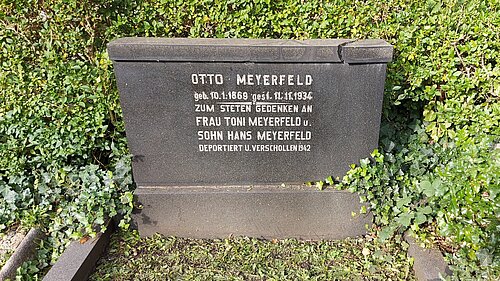Holocaust memorial day

On this solemn day of remembrance for the victims of the holocaust, I recall my own family history. My Grandma was a German Jew from the historic city of Aachen. Her father was a well reputed local doctor and her mother hailed from the university city of Heidelberg.
My Grandma was “lucky”; her parents had the foresight to send her to boarding school in England in 1934, and she lived in the UK from then on. My great grandparents left Germany for Belgium in 1938 after the situation in Germany became intolerable.
Miraculously my great grandparents survived World War two. Although my Grandma was safe, being forced to leave your home country on your own aged 14 to live in a foreign country whose language you barely speak, wasn’t easy. When World War two broke out, she frequently didn’t hear from her parents for months on end, so couldn’t be sure they were still alive.
Other members of her family were not so lucky. Her maternal aunt and cousin were both murdered by the Nazi’s. Her aunt was murdered in the Treblinka concentration camp, and her cousin perished in the Izbica ghetto, both in Nazi occupied Poland.
They are both commemorated on the gravestone of my Grandma’s uncle, who died of natural causes in 1934, in the Jewish cemetery in Aachen. I say “commemorated” because of course they are not actually buried there. The gravestone notes them as “deportiert und verschollen, 1942” (deported and lost).
Because most of my Grandma’s family escaped the holocaust, we know the stories of the family members who didn’t. Not everyone has that knowledge. Some British Jews who were brought to the UK as children via the Kindertransport, were only able to find out that the rest of their family were rounded up, deported and killed. They don’t know when or where.
Across the world we are seeing conflict and wars erupt including in Ukraine, Yemen, Israel/Gaza, Syria, Sudan and across the Sahel region of Africa. These conflicts are deadly for civilians; many have been tragically killed and many more injured and displaced.
Those who are displaced can end up seeking safety in other countries, usually neighbouring ones thus becoming refugees. Prior to World War two, there were European Jews who tried to flee to safety abroad and were turned away, which for many turned out to be a death sentence. While my Grandma did not arrive in the UK as a refugee, she later became one, but crucially was allowed to stay here.
The post-war UN refugee convention sought to create an international framework for genuine refugees to claim asylum, recognising the failures that resulted in many more deaths at the hands of the Nazis.
Today we are shamefully seeing British Conservative politicians seeking to downgrade or even scrap the international framework for refugees. This is not because people no longer face the horror of wars and human rights abuses in some countries, but because they don’t care about anything except “reducing immigration”.
It seems that the lessons of the holocaust may have been forgotten, which is even more reason to remember the victims, the horror and the inhumanity. We must also reaffirm our commitment to “never again” and to the post war international framework on refugees which grew out of the horrors of the holocaust. As the granddaughter of a refugee, I will always defend the right to asylum. #RefugeesWelcome.
Rebecca Taylor is the Liberal Democrat Parliamentary Spokesperson for Walthamstow